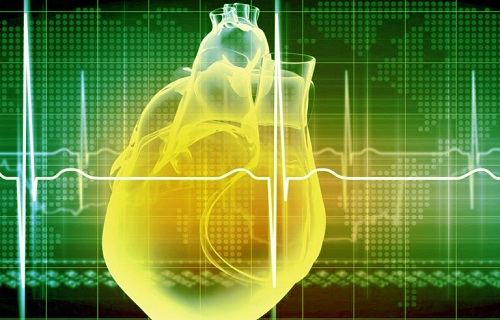Nikhil Prasad Fact checked by:Thailand Medical News Team Oct 14, 2024 1 year, 3 months, 3 weeks, 2 days, 7 hours, 12 minutes ago
Medical News: As the world continues to battle the effects of COVID-19, scientists and healthcare professionals are constantly searching for ways to improve patient outcomes. Beyond the virus’s devastating impact on the respiratory system, it has been linked to severe cardiovascular complications, making early detection of heart issues crucial. This
Medical News report will explore the association between pre-hospital electrocardiogram (ECG) abnormalities and increased mortality rates in COVID-19 patients. The findings are based on a recent study conducted by researchers from the South Western Ambulance Service NHS Foundation Trust-UK in collaboration with the University of the West of England-UK.
 Pre-Hospital ECG changes linked to higher mortality in COVID-19 patients
Pre-Hospital ECG changes linked to higher mortality in COVID-19 patients
The study highlights how certain ECG changes observed before patients are hospitalized can signal a higher risk of death.
Why ECG Matters in COVID-19 Cases
While COVID-19 is widely known as a respiratory disease, it is increasingly clear that its effects extend to other vital organs, particularly the heart. Many COVID-19 patients suffer from heart-related complications, such as heart failure, arrhythmias, and myocarditis, leading to worsened outcomes. An electrocardiogram (ECG) is a simple, non-invasive test that records the electrical activity of the heart. It helps doctors detect irregular heartbeats and other issues.
Researchers in this study set out to determine whether abnormalities detected in pre-hospital ECGs, such as those performed in emergency departments, were linked to higher mortality rates in COVID-19 patients. The study findings could help emergency medical staff better assess which patients need urgent care.
Key Findings of the Study
Common ECG Abnormalities Linked to Mortality
The study reviewed data from eight different cohort studies involving COVID-19 patients who had ECGs taken before they were admitted to the hospital. It found several common ECG abnormalities that were associated with an increased risk of death. These included:
-Non-sinus rhythms: Heartbeats that do not follow the normal rhythm, often indicating underlying heart problems.
-QTc prolongation: A condition where the heart takes longer to recharge between beats, potentially leading to dangerous arrhythmias.
-Atrial fibrillation: A common irregular heartbeat that can increase the risk of stroke and heart failure.
-ST-segment changes and T-wave abnormalities: These indicate that parts of the heart may not be getting enough oxygen, often seen in heart attacks.
-Right ventricular strain: A sign of increased pressure in the heart, which can occur due to lung problems or heart failure, both common in severe COVID-19 cases.
g>Increased Mortality Linked to Specific ECG Patterns
Patients with these specific ECG changes were found to have a significantly higher risk of mortality. For example, those with QTc prolongation or right ventricular strain had a greater likelihood of death compared to patients without these issues. The study emphasized that these findings could help doctors in emergency settings better predict which patients might need more aggressive treatment or monitoring.
Understanding the Impact of Right Ventricular Strain and Other Findings
The research paid particular attention to right ventricular strain (RVS) patterns, which showed a strong correlation with mortality. Right ventricular strain occurs when the right side of the heart, responsible for pumping blood to the lungs, faces too much pressure. This can be caused by lung complications, such as those seen in severe COVID-19 cases.
Three studies within the review provided solid evidence that patients exhibiting RVS patterns on their pre-hospital ECG had much higher odds of mortality. This suggests that early identification of these patterns could allow for quicker interventions, potentially saving lives.
Atrial fibrillation was another abnormality that stood out in the research. Patients who showed signs of atrial fibrillation or flutter had a significantly higher risk of death. As COVID-19 can exacerbate existing heart conditions, these findings underline the importance of early detection and treatment.
Implications for Emergency Medical Care
The study’s findings highlight the importance of using ECGs not only after hospitalization but also in pre-hospital settings, such as during ambulance transport or in the emergency department. If healthcare providers can identify these high-risk patterns early on, they can prioritize care for patients who are more likely to suffer severe outcomes.
For instance, recognizing prolonged QT intervals or RVS patterns in a patient with COVID-19 could prompt immediate interventions, such as administering medications to stabilize the heart or providing oxygen therapy. The researchers suggest that using ECG as a screening tool could lead to better outcomes and more targeted treatment.
Challenges and Limitations
While the study provided valuable insights, there were some challenges and limitations. Most of the data analyzed came from patients already presenting at emergency departments, meaning that true pre-hospital data (such as those obtained in the ambulance) were limited. Furthermore, the researchers acknowledged that certain factors, like pre-existing heart conditions or medications administered during hospitalization, could influence the results. As such, more research is needed to fully understand how ECG abnormalities prior to hospitalization can predict outcomes in COVID-19 patients.
Conclusion
The study makes a strong case for the use of ECG as a vital tool in assessing COVID-19 patients before they reach the hospital. By identifying key abnormalities such as non-sinus rhythms, QTc prolongation, and right ventricular strain, healthcare providers can better predict which patients are at higher risk of mortality. This early detection could lead to more timely and effective treatments, potentially saving lives.
The importance of this research lies in its potential to reshape emergency medical protocols, ensuring that high-risk COVID-19 patients are identified earlier and given the care they need. For everyday individuals, this study underscores the hidden dangers that COVID-19 poses to heart health and the importance of early and comprehensive medical evaluation.
The study findings were published in the peer-reviewed journal: Annals of Noninvasive Electrocardiology.
https://onlinelibrary.wiley.com/doi/10.1111/anec.70016
For the latest COVID-19 News, keep on logging to Thailand Medical News.
Read Also:
https://www.thailandmedical.news/news/breaking-covid-19-news-sars-cov-2-infections-can-cause-brugada-syndrome
https://www.thailandmedical.news/news/covid-19-clinical-care-electrocardiographic-ecg-abnormalities-and-troponin-levels-can-envisage-covid-19-mortality
